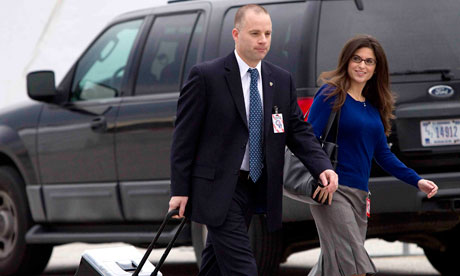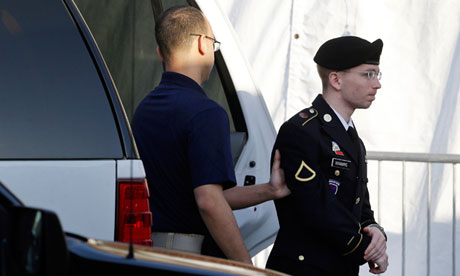After 1,100 days in military captivity, Bradley Manning finally goes to trial on Monday, for leaking a trove of state secrets to WikiLeaks.
What is Manning charged with?
The US soldier faces 21 counts flowing from the leaking of hundreds of thousands of classified digital files to WikiLeaks. The most serious charge is "aiding the enemy" – in effect, helping al-Qaida by making intelligence accessible on the internet – which carries a life sentence. In addition he is accused of "wrongfully and wantonly" causing US intelligence to be published on the internet and faces 14 counts relating to various elements of the WikiLeaks disclosures, as well as five counts of violating military computer rules – all of which add up to a possible maximum sentence of more than 150 years in military jail.
Hasn't Manning admitted to being the WikiLeaks source?
Yes. He has pleaded guilty to having transmitted digital information to WikiLeaks between 1 November 2009 and 27 May 2010 – a period in which he was working as an intelligence analyst at Forward Operating Base Hammer outside Baghdad, with access to secure US government databases storing classified information. The leaks included a video, dubbed by WikiLeaks "Collateral Murder", which depicts a July 2007 US Apache helicopter attack in Baghdad in which civilians, including two Reuters journalists, were killed; war logs from Afghanistan and Iraq; and 250,000 diplomatic cables from US embassies around the world. The lesser offences to which Manning has pleaded guilty carry a maximum sentence of 20 years.
Where is the trial being held?
It will open at 9am this morning in a court room within Fort Meade, in Maryland. Manning will be accompanied by his team of three defence lawyers, led by David Coombs, while the prosecution team, also three strong, will be led by Major Ashden Fein. There will be no jury, at Manning's request, which puts Colonel Denise Lind, the presiding authority, in the role of both judge and jury. Some 80 reporters have been granted media places, with a further 270 turned away for lack of space.
How long will the trial last?
The US government has set aside almost three months, with the court sitting from Monday to Friday, with occasional breaks forced by a furlough on civilian defence employees as a result of federal budget cuts. The exceptional length of the trial is explained by the fact that the prosecution has indicated it intends to call more than 140 witnesses in an attempt to secure a watertight conviction. The prosecution will unveil its witness list in batches of 25 as the trial proceeds.
What will the prosecution have to prove to secure a guilty verdict
Lind has issued very clear guidelines as to what the prosecution will have to prove beyond a reasonable doubt. On "aiding the enemy", it must prove that Manning "knowingly gave intelligence information to al-Qaida, al-Qaida in the Arabian peninsula" and a further terrorist group which remains unidentified. For the other counts, it must prove that the soldier leaked information that related to national defense and that he had reason to believe that once communicated it could be used "to the injury of the United States or to the advantage of any foreign nation".
Will the trial be held entirely in public?
No. That has been one of the bones of contention during prolonged pre-trial hearings between Manning's attorneys and the prosecution. A trial that is all about state secrets has been conducted so far amid an unprecedented degree of secrecy – with key public documents such as prosecution motions and transcripts of court proceedings kept hidden from the public.
The trial is likely to be no exception to this trend. The judge has ruled that 24 prosecution witnesses, including US ambassadors, senior military figures and intelligence chiefs, can give testimony partially in secret. Manning will be present at the closed portions of the testimony, but no reporters or members of the public present.
A further irony is that much of the testimony covered in the closed sessions is likely to relate to classified documents that are already freely available to the public through WikiLeaks. Michael Ratner of the Center for Constitutional Rights, said:
The bottom line is that they are hearing a lot of witness testimony in secret so that they can discuss WikiLeaks documents that are already in the public domain. That's a completely absurd reason for closing parts of a trial.
In addition, up to four prosecution witnesses will be allowed to give evidence wholly behind closed doors. The court will be moved for the duration to an undisclosed location where the witnesses will present evidence dressed "in light disguise".
What will the defence do during the course of the trial?
 David Coombs, defence attorney for Bradley Manning. Photograph: Joshua Roberts/Reuters
David Coombs, defence attorney for Bradley Manning. Photograph: Joshua Roberts/Reuters
As with a civilian criminal trial, the defence will be allowed to cross-examine prosecution witnesses, and will then be calling its own. It is not clear how many defence witnesses will be listed, but we do know some names. They include Colonel Morris Davis, former chief prosecutor at Guantánamo Bay, Harvard law professor Yochai Benkler and former US ambassador Peter Galbraith.
What will happen at the end of the trial?
Given that Manning has already pleaded guilty to lesser offences, it is likely that the trial will end with a guilty verdict of some degree – though how serious it will be will depend on Lind when she comes to deliver her verdict and then sentencing. During the sentencing phase, the defence will be able to present a slew of evidence that it has been forbidden from discussing before the verdict – notably Manning's motive for leaking and his state of mind at the time he did it.
One defence witness likely to be called at sentencing, Lauren McNamara, had an AOL instant messenger chat with Manning that lasted intermittently from February and August 2009, before the soldier contacted WikiLeaks. She told the Guardian that her cyber conversations with the soldier had shown him to be without malice or anti-American feelings or any desire to harm anyone:
He seemed a well-adjusted guy who was confident in the military even though he had had some bad experiences, and was pretty positive in attitude.
In pre-trial hearings, the defence discussed Manning's emotional problems in FOB Hammer, including his conflict over his sexual orientation. Defence attorneys suggested that the soldier was not given sufficient duty of care from his superiors – an argument that might resurface in mitigation. There have also been questions raised about whether Manning should have been sent to a tour of duty in Iraq in the first place.
In a statement that Manning read out to court, he gave an insight into his motives for leaking that is also likely to be pivotal during sentencing, in seeking to show that his intentions were not to harm the US but to enhance its moral standing. He said that at the time he leaked the documents he had wanted to "spark a debate on the military and our foreign policy in general" and that the American public had a right to know "the true costs of war".
Will Manning have the right to appeal at the end of the trial?
One of the major differences between military and civilian trials is that in the military context the right to appeal is far more limited. In a civilian criminal case, a convicted prisoner can appeal right up to the US supreme court, the highest judicial panel in the land. No such right exists in military cases. Here, the convicted party can ask for a review by the Court of Appeals for the Armed Forces (CAAF), but if it declines the case there is no equivalent route to the US supreme court.
Eugene Fidell, an expert in military justice at Yale law school, pointed out that even Khalid Sheikh Mohammed, the suspected architect of the 9/11 attacks, has greater rights of appeal than Bradley Manning. "If he's convicted by a military commission in Guantánamo, KSM will get a straight shot at the US supreme court," he said. "By contrast, if CAAF denies Manning a review as it does in most cases, he will be out in the cold."



